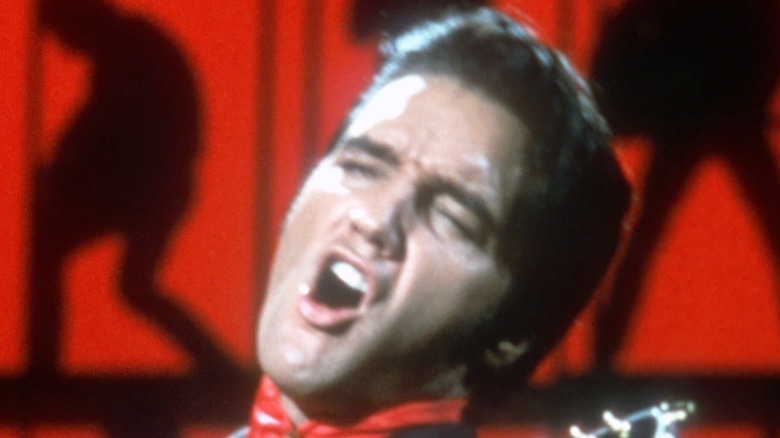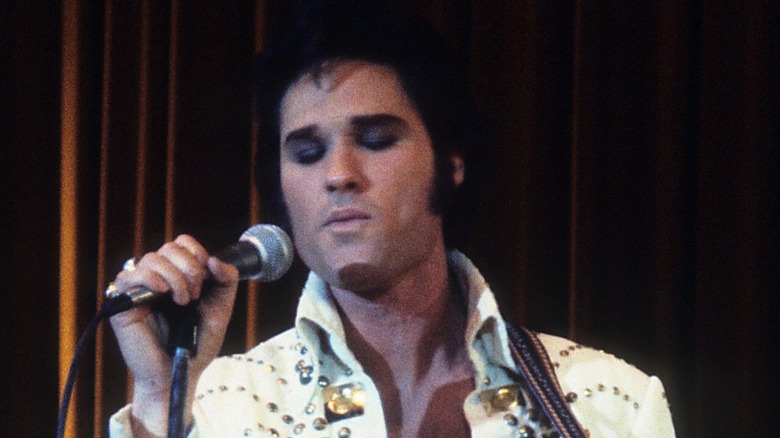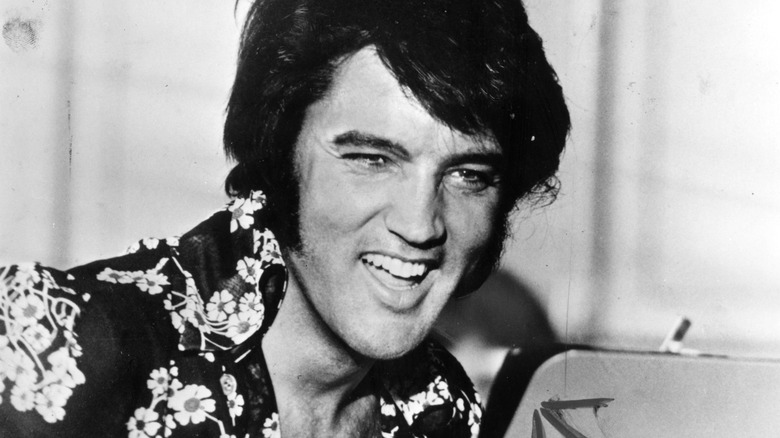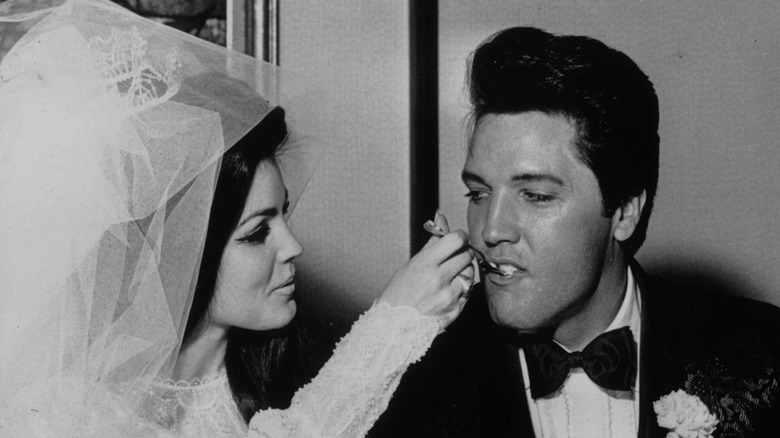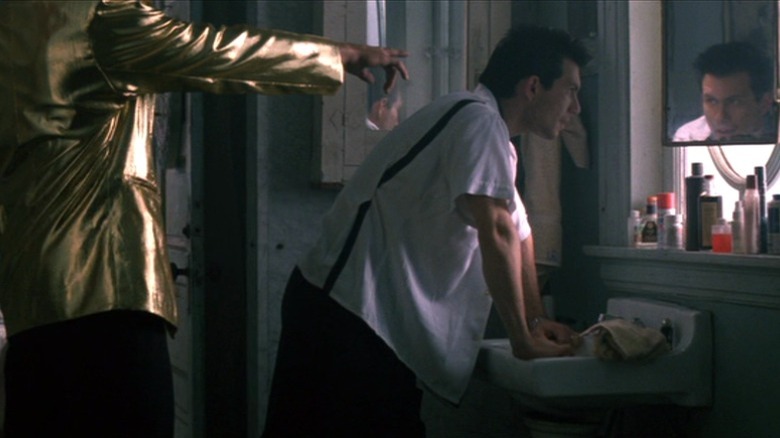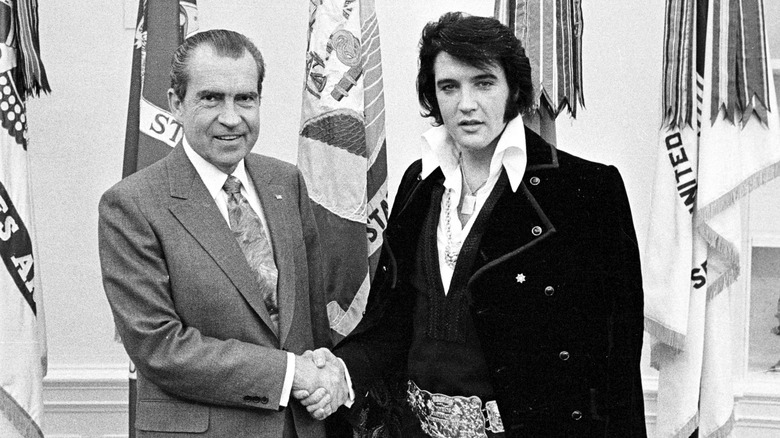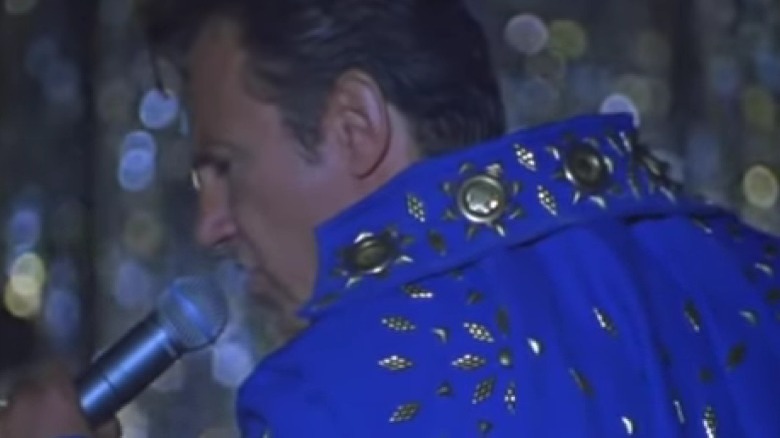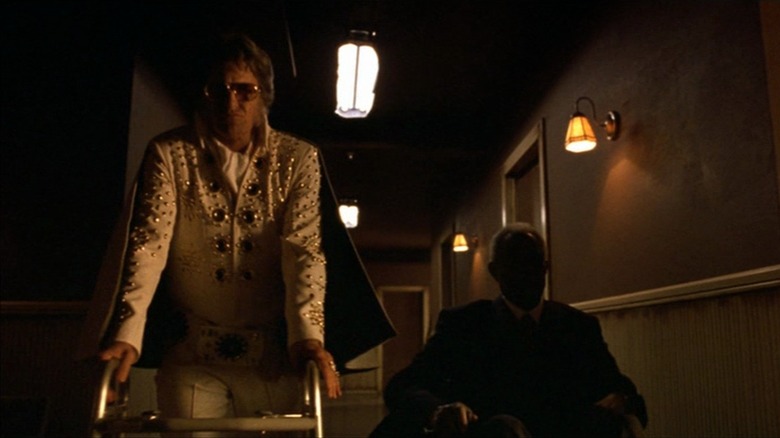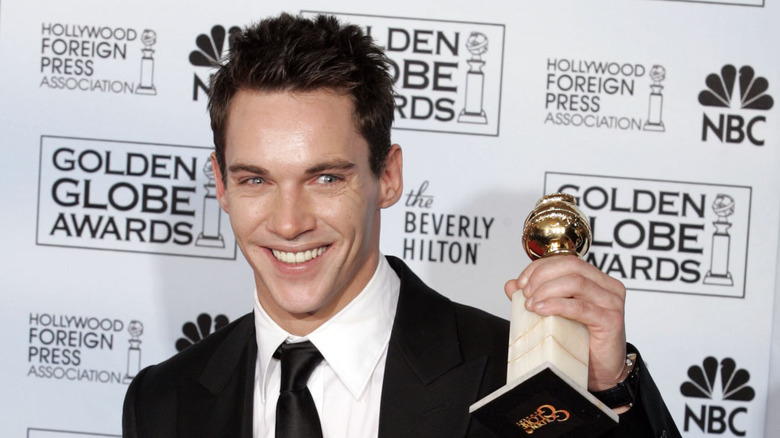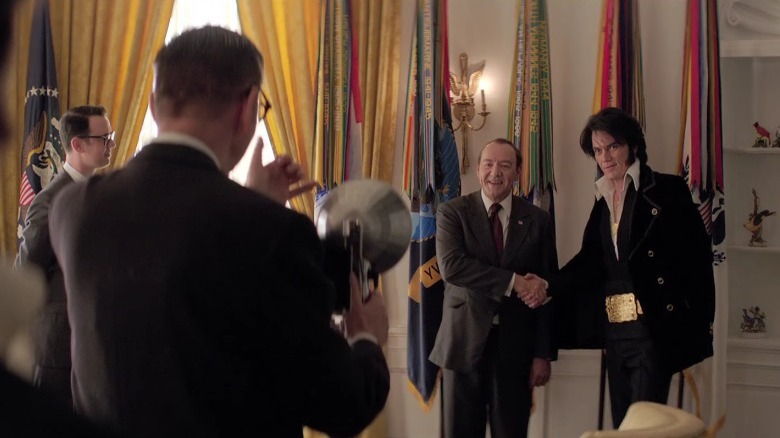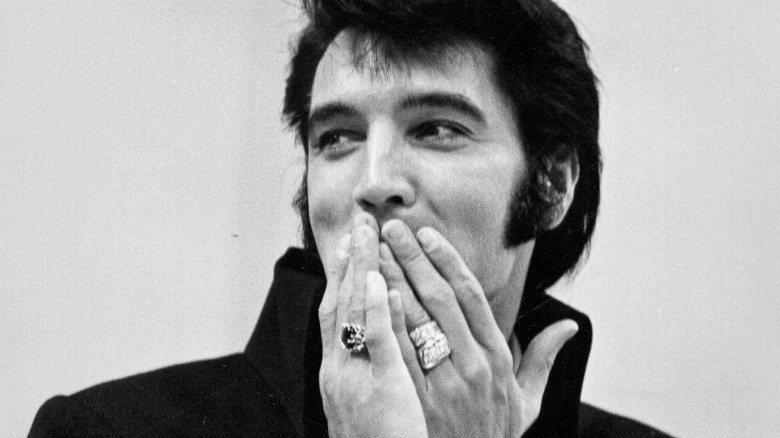The Best Movies About Elvis Presley
Kings attract acolytes, even after they pass, and even if their realm is a musical genre. Elvis Presley has been dead 45 years, yet his records still sell, his impersonators still prowl Las Vegas, and his movie legacy continues. Presley's own acting career didn't come to all he'd dreamed it would; per TCM, early hopes for dramatic parts gave way to programmers easily written off by the critics. But the King of Rock 'n Roll has been a subject for motion pictures far more than he was an active participant.
Entertainment reporter John Beifuss covered Presley's ongoing presence in cinema for the Commercial Appeal for 21 years. In his assessment, "Elvis never left the building, if the building was a movie house." Not a year has gone by since his death in 1977 where some tangible reference to Presley hasn't made its way into mainstream film. And works specifically about Presley, fiction and nonfiction, continue to this day; Baz Luhrmann's "Elvis" is just the latest example.
To be sure, not all films about Presley are about to sweep the Oscars or the Emmys. Cultural icons make easy fodder for cynical cash-grabs, or crutches for unsteady screenplays. But the best such films can have something profound to say about such iconic figures, or their followers, or else use their iconography and legacy in a meaningful way in an original story. Here are a few highlights from the catalog of Elvis movies.
Elvis (1979)
Elvis Presley isn't the subject most would immediately think of for a director like John Carpenter. He had already made his name with "Halloween" when he became attached to Dick Clark Productions' TV biopic. In an interview promoting the film at the time (via YouTube), Carpenter called "Elvis" a personal film. He was a big fan of the man's music, and he was intrigued by the elevation of someone into mythic status. The film's star, Kurt Russell, wasn't so big a fan according to Phil Nobile Jr. of BDM, but he had his own connection to the part; he got his start in movies kicking Presley's shins in "It Happened at the World's Fair."
"Elvis" was Russell's first significant acting job as an adult, and his Emmy-nominated performance was so strong that critic and Elvis movie expert John Beifuss called it "the definitive screen portrayal of Presley" in the Commercial Appeal. His take on the rock star is that of a vulnerable outside, never quite satisfied that success has brought him all there is to life. Russell is supported throughout the film by the work of singer Ronnie McDowell, whose uncredited covers of Presley's records carry the musical numbers.
Coming so soon after Presley's death, "Elvis" acted as a rebuttal to the tabloid image of a bloated has-been that dominated in years prior. Collider called it the most earnest of Carpenter's films, and it marked the beginning of his and Russell's long and fruitful collaboration.
This is Elvis (1981)
Documentaries have a choice in how they portray their subjects. They can rely on archival or freshly captured footage, they can reenact material through staged "docudrama" scenes, or they can be guided by the recollections of interviewees. "This is Elvis" makes use of all three methods.
Three different actors play a young Presley for recreations, and various figures in his life offer remembrances and narration. But the most striking element of the film at the time of its release in 1981 was the look into Presley's life through his own material. Colonel Tom Parker allowed the release of home movies and shooting on the Graceland property (per film critic Roger Ebert) and the result was a striking illustration at the long deterioration of Presley's health, even as his charisma before an audience endured.
Variety called the blend of styles in "This is Elvis" "an imaginative combination," backed up by plenty of Presley's greatest hits. Singled out was the look into the singer's state of health by the last year of his life. Narrator Ral Donner assumes Presley's voice to offer some insights the man might have had, had he lived to look back on that period. "If only I coulda seen what was happening to me," Donner's Presley says over the archival footage, "I mighta done something about it."
Elvis and Me (1988)
Priscilla Presley's account of her marriage, "Elvis and Me," became a bestseller when it hit bookstores in 1985 (per the New York Times). It recounts their early (and chaste) courtship and the gentle, playful moments in their time together, but Priscilla didn't spare details on the other side of their relationship. She wrote of struggles with jealousy, Elvis' affairs (via People) and exercises in control over every aspect of Priscilla's life, and the difficulties surrounding Lisa Marie Presley's birth. The Washington Post described "Elvis and Me" as a "sad, sweet book." Three years later, it became a sad, sweet TV movie.
Priscilla acted as a co-executive producer on "Elvis and Me." While she wasn't a fixture on the set (per the Post), she was available to actors Susan Walters and Dale Midkiff with additional details to translate her memoirs into television. The focus was on the emotional conflict between the Presleys, and it left a strong mark on Walters in particular. "Almost every day I cried about something as Priscilla," she said of the production. "I thought it was an actor's cliche to say 'I have to recharge' after playing a role. But after this show, I was emotionally flat." Midkiff concurred, describing Elvis and Priscilla's romance as a melodrama and a rollercoaster.
True Romance (1993)
It would not be true to say that "True Romance" is about Elvis Presley. It's about Clarence Worley (Christian Slater) instead, comic store clerk and aficionado of the King. He's such a fan, in fact, that the spirit of his idol (Val Kilmer) appears to him from time to time, offering advice on such everyday dilemmas as whether or not to kill the pimp who controls Worley's wife Alabama (Patricia Arquette). Taking that advice puts the young couple on the road to Los Angeles with a suitcase full of stolen cocaine to fund their life together with, unaware that the Mafia is on their trail to reclaim their stash. But even as the heat turns up, Presley insists all is going well.
According to Film Cred, writer Quentin Tarantino's luck had his script for "True Romance" sold just as he was making waves with "Reservoir Dogs." Directorial duties were assumed by Tony Scott, and the mesh of the two styles won raves. Roger Ebert said of the film: "[It's] made with such energy, such high spirits, such an enchanting goofiness, that it's impossible to resist." Slater's brave-but-dumb hero and Arquette's hooker with a heart of gold proved so endearing even during filming that Scott prevailed over Tarantino's objections to give them a happy ending, one with a little baby named for the rock star whose spirit so helpfully offered wisdom — and whose bust got Alabama out of a jam with mob underboss Virgil (James Gandolfini).
Elvis Meets Nixon (1997)
It's one of the strangest pictures to come out of the White House: Richard Nixon, 37th president and perpetual curmudgeon, shaking hands with Elvis Presley, a charisma-oozing rock star not quite yet gone to seed. According to the Washingtonian, the photo of these unlikely chums is the most requested of the National Archives, and it came about from a spur-of-the-moment visit Presley paid to the White House, hoping for a badge and a chance to get involved in the fight against drugs. It sounds more like the premise of a movie than a real moment in presidential history.
Showtime Networks indeed decided the meeting should be a movie in 1997. "Elvis Meets Nixon," directed by Allan Arkus, depicts Presley's trek from Graceland to Washington by way of Los Angeles. It posits that the journey was his first time out in the world as an adult without handlers, turning the King (Rick Peters) into a fish out of water who can't work a credit card, recognize the Jackson Five on the radio, or buy doughnuts without holding up the store.
"Elvis Meets Nixon" is a mockumentary, its "reenactments" of Presley's trip framed by a series of talking heads led by Dick Cavett. The New York Times singled Cavett out for his deadpan performance as the film's chief narrator. It also gave the film as a whole high marks for a playful tone and affectionate recreation of the actual meeting between president and pop idol.
Finding Graceland (1998)
A big piece of the Elvis Presley legacy is the impersonators. Whatever compels a man to don a sequin jumpsuit and put on a Southern drawl while covering rockabilly tunes, it's an enduring cultural tribute. That one of these lookalikes might be the King himself has been a popular concept for fiction writers. Director David Winkler and screenwriter Jason Horwitch took a turn with the idea in 1998's "Finding Graceland" for Largo Entertainment.
Harvey Keitel stars as a hitchhiking impersonator convinced that he is the genuine article, bound and determined to reach his old Graceland home. He's picked up by Byron Gruman (Jonathon Schaech), a despondent young man drifting aimlessly after losing his wife. Gruman becomes a reluctant caretaker to the supposed Presley, agreeing to see him at least part of the way to Memphis in time for the anniversary of his "death." Whether or not Keitel's hitchhiker is who he thinks, his persona wins him friends easily, and he's not long in putting it to the work of mending his driver's broken spirit.
The public Elvis persona that impersonators adopt — and that Keitel's character may or not be deluded by — wasn't the whole man, and the mythology built up around that persona can be a little silly. But film critic MaryAnn Johanson felt that a light touch of fantasy made such artifice acceptable. And the point of the film, she argues, is that fantasies like a wandering, beneficent Elvis do real good in the world.
Bubba Ho-Tep (2002)
A geriatric Elvis Presley, a black man convinced that he's John F. Kennedy, and a mummified pharaoh wearing a cowboy hat. Are there any three more natural co-stars? "Bubba Ho-Tep" began as a novella, part of the anthology project "The King is Dead" (per Ain't it Cool News). It's the story of how Presley (Bruce Campbell), tired of his hollow existence as an idol, switched places with an Elvis impersonator to regain a measure of anonymity. Age and accidents land him in a nursing home where his only friend, Jack (Ossie Davis), believes he is President Kennedy, his skin dyed by Lyndon B. Johnson. The two of them are the only ones who know that a mummy is consuming the souls of their fellow residents and unite to take the undead down.
Everything about "Bubba Ho-Tep," from its premise to the casting of Campbell as Presley, suggests a cheesy cult movie, and the film isn't afraid to put its tongue firmly in cheek. But its makers took pains to avoid formula. "Love it or hate it," writer Joe R. Landsdale told AICN, "you won't come out sayin' there are two just like it." A key way it defies expectations, according to Empire, is its embrace of black humor rather than broad laughs. Campbell's Presley is a regretful, introspective man in his twilight. The film treats its elderly subjects with dignity, per IGN, and it's a character study just as much as it's a horror comedy.
Elvis: The Early Years (2005)
Irish actor Jonathan Rhys Myers took home the Golden Globe in 2006 (per the Irish Times) for his portrayal of Elvis Presley in "Elvis: The Early Years" the previous year. Richard Harrington of the Washington Post (via the Spokesman-Review) said of Myers' performance: "[He] does for Elvis Presley what Jamie Foxx did for Ray Charles in 'Ray' — he becomes him." The two-part miniseries for which Rhys Myers won his accolades serves as a straight biopic chronicling Presley's troubled adolescence, his initial rise to fame, the complications in his love and family life, and his 1968 comeback. It's the comeback concert that acts as bookends for the series, Presley's stage fright prior to going on triggering his recollection of everything that's led him to that moment.
"Elvis: The Early Years" was the first dramatization of Presley's life given the rights to use his own recordings for the musical numbers. The Elvis Presley Estate's cooperation with the film could invite accusations of sugarcoating, but Harrington insists otherwise. "Elvis" doesn't shy away from its subject's foibles, whether that's his inability to extricate himself from Colonel Tom Parker's (Randy Quaid) control or his growing addiction to prescription drugs. Rhys Myers' commitment to the part was strong enough that he kept in character between takes, bought some genuine Elvis costume pieces to use on the series, and came away from filming with his impression of Presley — defined by the singer's declining late period in Las Vegas — completely turned around.
Elvis & Nixon (2016)
The photograph of Elvis Presley and Richard Nixon together is so popular — and so strange — that it's inspired multiple interpretations in cinema. Almost 20 years after Showtime Networks made a mockumentary of Presley's cross-country trip to reach the White House in "Elvis Meets Nixon," Amazon Studios distributed "Elvis & Nixon." Starring Michael Shannon as Presley and Kevin Spacey as Nixon, the film forgoes a lengthy travel sequence. Instead, it focuses on the efforts of Presley and the White House staff to arrange the meeting with Nixon, with the last third of the film devoted to the conversation the two men might have had before their famous photo-op.
Shannon is not a close physical match for Presley, a fact emphasized by the film's use of pictures of the real deal in its credits. But Peter Travers, writing for Rolling Stone, felt that Shannon found the way to a heartfelt and gently humorous performance. As for the since-disgraced Spacey's Nixon, Travers described his portrayal as "a deft characterization that never drifts into caricature." With the meeting between Nixon and Presley the extended climax of the film, having good actors who could play off one another well was crucial to its success. If the build-up to their talk can feel drawn out, the conversation itself delivers. "It ain't fact," wrote Travers of the comedy-drama's take on what Presley and the president had to say, "but it is d*** entertaining fiction."
Elvis Presley: The Searcher (2018)
As an enduring fixture in American pop culture, Elvis has an evolving story as an icon and artistic force as well as a long-concluded story as a man. HBO's "Elvis Presley: The Searcher" explores where those stories meet and why they matter to Presley's fans. Like "This is Elvis" before it, "The Searcher" benefitted from a wealth of archival materials never before available, in this case from Priscilla Presley and family archivist Jerry Schilling (per A.V. Club). No figures appear before the camera except in archival material; all interviews are audio-only, used to complement both new and familiar footage of Presley's life.
"The image of Elvis shifts, depending on the entry point," writes Sheila O'Malley for RogerEbert.com. "What's so refreshing — d*** near redeeming — about ["The Searcher"] is that the entry point is Presley's art." The work he put into his career and what made his performances so unique takes center stage in this documentary. Archives and interviews give some sense of Presley's attitude toward that process, while successor rockers like Bruce Springsteen weigh in with their own assessments of the King's talent and the reasons for his longevity. Along the way, "The Searcher" asks about fan expectations as well. Presley himself alluded to the issue in a 1972 interview used for the film. "The image is one thing," he said when asked if he enjoyed his public persona. "The human being is another. It's very hard to live up to an image."
